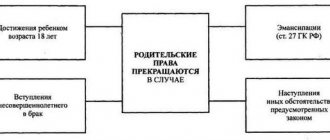Author of the article: Lina Smirnova Last modified: January 2021 28512
Deprivation of the right to be called parents in the legal sense awaits the father or mother, and sometimes both of them, if they fail to fulfill their direct responsibilities to provide the child with living conditions for normal physical and spiritual development. This punishment is extreme and, according to statistics, is more often applied to the father. Let's consider what reasons may be the basis for this, what documents will be required to deprive a father of parental rights, what are the specifics of the trial without the presence of the father, and what consequences await the family and the father himself if his parental rights are revoked.
Reasons for deprivation of paternity
In most cases, the circumstances of the deprivation process are accompanied by unpleasant proceedings, claims, and the establishment of unpleasant facts from the parent’s biography.
Meanwhile, there are frequent cases when a mother intends to deprive the father of his rights to the child, without sufficient grounds, acting against her ex-husband only to please her own emotional state during the divorce. To make a fair decision regarding the relationship between the parent and the child, the court will proceed from the weight of the grounds and the evidence presented by both parties. In the court ruling, when satisfying the claim of the mother or other interested party, there must be references to articles of the Family Code that give the right to deprive parental rights - Art. 69-70.
The following circumstances make it possible to file a claim for termination of parental authority against the father:
- Abuse of rights by an adult, with further negative impact on a minor.
- Refusal to pick up the baby from the maternity hospital, medical facility, or preschool.
- Domestic violence, illegal actions aimed at a minor, including psychological pressure, sexual assault.
- Chronic alcoholism, confirmed drug addiction.
- Malicious evasion of child support, deliberate refusal to fulfill parental responsibilities, participation in the life of a child.
Due to the fact that many of the stated circumstances are accompanied by administrative and criminal offenses, the presence of a prosecutor is ensured at court proceedings.
Sample application for deprivation of paternity - what should be included in the claim?
When preparing a claim, special attention is paid to:
- compliance with the format and structure of the document;
- correct formulation of requirements in accordance with current legislation;
- providing a sufficient evidence base, confirmed in the appendices indicated below under the text of the main part of the claim.
The statement of claim must contain the following details:
- The exact name of the court.
- Information about the plaintiff (full name, place of residence) and his representative (if the document is not submitted personally by the applicant.
- Information about the defendant's party (indicate similarly to information about the plaintiff).
- The main part provides a description of the situation, details and reasons that forced one to apply to the judicial authority (reasons supported by documents are given, indicating the existence of legal grounds for termination of parental rights.
- Facts of violations must be supported by references to legislation.
- Below is a list of the attached evidence (lists those documents that will be considered during the proceedings, in support of the plaintiff’s words).
Statement of claim for deprivation of parental rights (paternity) (29.5 KiB, 45 hits)
In addition to the original application, a second copy is prepared for the defendant, and if other interested parties are involved, the number of copies must correspond to the number of parties involved.
When depriving a father of his rights, there are no established standard document requirements. Cases are considered individually with the possibility of challenging and presenting evidence and arguments on both sides.
In judicial practice, there are cases when a mother abandons her newborn in the maternity hospital and does not want to take him away. When collecting documents for deprivation of the mother’s parental rights, you must attach such a refusal. Mothers should be aware that after signing a waiver, they are not automatically released from the minor, but continue to bear all responsibilities.
In Art. 69 of the RF IC provides an exhaustive list of life situations when a parent is released from rights to a minor. Each basis expands the list of documents for deprivation of parental rights and is supported by additional certificates and evidence.
Deprivation of parental rights; a procedure that requires great moral and physical effort.
Typically, the defendant in such proceedings is a negligent father who does not help support the child, does not participate in his upbringing and does not even want to communicate with him.
It is not always clear to many how to start the legal process, because simply fill out a sample application for deprivation of paternity; only half the battle.
In order for the court to consider the situation comprehensively, taking into account individual characteristics, you need to know some legal nuances.
According to the law, not everyone can go to court to file a claim for deprivation of paternal rights. Outsiders do not have this right.
- Mother of the child. In this case, the right to file a claim is confirmed by the fact of relationship based on the birth certificate.
- Guardian/Trustee. It is important to know that guardianship and trusteeship must be official. Thus, grandparents who do not have formal guardianship cannot deprive the father of their grandson of parental rights, and official guardians, even in the absence of kinship, can file such a claim for consideration.
- Guardianship and trusteeship authorities, the prosecutor's office, as well as authorities protecting the rights of the child, at the request of third parties. It is to these institutions that citizens who do not have the right to file a claim in the case of deprivation of paternity themselves need to apply for its filing, and they, in turn, after conducting a thorough check of the circumstances, can satisfy their request.
If you decide to initiate legal proceedings to deprive a father of a child, it is important to know that a citizen who is deprived of paternity will forever lose any rights based on the relationship with the child. Officially, neither the child nor his descendants will be related to the father, therefore such a parent cannot claim inheritance, maintenance, benefits and allowances associated with them.
Lawsuit; this is a way of transmitting information to the judicial authorities to initiate proceedings on it.
It must be in writing and contain all the necessary data, presented clearly and in a legally competent form.
In the case of an incorrectly drafted claim, the court may legally refuse to consider it.
Please format your application header correctly:
- the name and address of the court must be correct;
- the details of the plaintiff and defendant must be complete (indicate all known contact information);
- determine and indicate in the claim the guardianship to be brought into the case.
In the body of the application write:
- specific facts in favor of deprivation of rights to a child and the chronology of your family relationships;
- indicate the articles of law you are referring to;
- Please indicate the requirements in the petition part completely and consistently.
Be sure to pay the state fee for the legal process (the claim will not be accepted without payment).
Submit all necessary documents to the judicial authority immediately along with the claim so that the court can study the case in full.
To correctly present the demands for deprivation of paternity in a lawsuit, it is necessary to know the grounds for consideration of such an application by the court. These include:
- unwillingness to fulfill parental responsibilities;
- evasion of alimony payments;
- abuse of rights to a child;
- alcoholism or drug addiction in the father;
- cruelty to a child;
- a crime committed against a child or his mother;
- reluctance to take the baby from the hospital.
The left corner at the top of the application form (A-4 format sheet) must contain the following information:
- full name of the court;
- plaintiff's details: for legal entities; name of the organization, its address (legal), full name of the head; for individuals; Full name, address (registration and actual), telephone and email;
- data of the representative, details of the power of attorney (if representation takes place);
- data of the defendant (similar to the data of the plaintiff);
- data of the prosecutor who approved the claim;
- data of the guardianship authority that issued the act on the merits of the case.
In the descriptive part of the application, the plaintiff must describe in detail in legal language the specific facts of unlawful treatment of the child and put forward his demands (deprive the father of parental rights, collect alimony). You must specify:
- the child’s age and details of his birth certificate (if the child has a passport, then passport details);
- details of marriage certificates, divorce certificates (if any), when they stopped living together;
- grounds for deprivation of paternity;
- evidence of unlawful treatment of the child and any arguments in favor of deprivation of paternity;
- request to deprive of paternity.
- who will take custody.
on deprivation of parental rights (additional requirements in the title, if any)
I, full name, from __ I am married with full name, divorced since__.
We suggest you read: What are the procedures for renting a car from an employee?
In __ year our child was born, full name, __ (date, place of birth). The father of the child is his full name, the mother of the child is his full name.
Relations with the father have been terminated since __, from that moment the child’s full name lives with me at the address: __.
The relationship between the child and the father (full name) develops as follows (indicate how the father communicates with the child and what exactly is not satisfactory). For example:
- the father has not communicated with the child since ___;
- the father has not supported the child and has not helped financially since __;
- the father is an alcohol abuser or a drug addict;
- the father uses cruel methods of education: beats, puts pressure on the child’s psyche;
- other violations of children's rights.
In accordance with __ (Constitution, Family Code), the child has the right to __.
The father's full name, who __ (indicate negative manifestations in the father's attitude towards the child), the above rights of the child are violated.
Considering this behavior of the father, Full Name, and his improper treatment of the child, Full Name, their relationship does not work out, child (indicate the child’s attitude towards the father and his opinion about depriving him of paternity):
- afraid of father's full name;
- does not want to see father's full name;
- does not know about the relationship with his father, Full Name, since Full Name is raised from birth.
According to Art. 69 of the RF IC, parents are deprived of their rights to children if__ (indicate the basis for deprivation). Guided by the above articles __, as well as the fact that the child’s full name is __ (indicate the child’s condition and his relationship to the father),
- Deprive the defendant's full name of parental rights to the child, full name __ (date, place of birth, details of the birth certificate), determine the child's residence together with the full name (parent/guardian).
- Here you can specify other requirements (procedure for paying alimony, etc.)
List of attached documents:
- Photocopy of the application.
- Photocopy of the plaintiff's passport.
- Photocopy of marriage certificate
- A photocopy of the divorce certificate.
- Photocopy of birth certificate.
- Other documents depending on the grounds.
- Receipt for payment of state duty.
Plaintiff Full name Signature Date
As can be seen from the final part of the sample, it is necessary to provide the court with additional documents. These include:
- a copy of the claim for all persons in the case;
- a copy of the child’s birth document or passport,
- a copy of the applicant's passport,
- copies of marriage and divorce documents;
- any documents as a basis for deprivation of rights;
- certificates of father’s income (for collecting alimony);
- certificate of children's residential address;
- document confirming payment of state duty.
Documents confirming the grounds for deprivation of paternity may be:
- medical certificates confirming that the father is registered as an alcoholic or drug addict;
- medical certificates about the child’s injuries resulting from abuse;
- certificates of arrears of alimony;
- certificates from the police about the father’s antisocial behavior and criminal record;
- reports from educational institutions on lack of child care and pedagogical neglect;
- acts and other documents on the dispute from the guardianship and trusteeship authorities;
- witness's testimonies;
- other documents to establish the truth in the case.
According to Russian law, filing a claim for deprivation of paternal rights to children must be accompanied by payment of a state fee.
In 2021, the fee for such a claim is 300 rubles. However, depending on additional requirements, its size can be increased.
Payment can be made in banks or using payment systems without commission. Some courts already have terminals for this. Details for paying the fee are indicated on information boards in the courts, and many of them provide forms with already printed data.
We are preparing a documentary base
The success of a presentation in court largely depends on the evidence presented and the content of the claim. It is recommended that you hire a lawyer who specializes in family law to help you. This will allow you to competently draw up a statement and think through a strategy of action aimed at satisfying the plaintiff’s demands.
Each case of deprivation of rights is individual, which requires the presentation of documents purely on specific circumstances.
The main list of papers includes:
- Personal documents of the plaintiff and his minor child.
- Document on marital status (marriage or divorce).
- Documents proving the defendant’s incompatibility with the status of a parent:
- reference from the employer, certificate from the place of employment;
- characteristics of place of residence;
- a pre-prepared inspection report of the housing in which the family lives;
- certificate of family composition;
- photographs and videos in favor of the mother;
- written testimony of witnesses.
The more evidence of a parent’s unlawful behavior towards their own child is established in court, the stronger the arguments about the negative impact on children, the higher the chances of success. If the father agrees with the change of status, the process happens faster. If the father is against it, you should be prepared to present comprehensive evidence, and if you challenge it, go through the process again.
| Article | Description |
| Article No. 69 of the RF IC | list of reasons that serve as grounds for deprivation of paternity |
| Article No. 70 of the RF IC | describes the procedure for deprivation of parental rights |
| Article No. 68 of the RF IC | protection of parent's rights |
| Article No. 78 of the RF IC | How do guardianship authorities participate in this type of procedure? |
Is it possible to deprive paternity by mutual consent through the registry office, find out in the article:
deprivation of paternity by mutual consent
.
If you are looking for what grounds there should be for depriving paternity in Russia, read here.
If you want to know where you can get a DNA paternity test, look here.
The procedure for depriving parental rights is quite complex and has many different nuances. Therefore, if possible, you should study judicial practice and the legislative framework, and consult with a lawyer.
Before filing a claim to deprive a spouse of paternity, it is necessary to prepare a package of documents. In some cases, the guardianship authorities help collect it, so it would be a good idea to find out if local officials in your region of residence will take care of collecting the necessary documentation.
What documents are needed to deprive paternity? Their list looks approximately as follows (depending on the situation, the list of business papers is adjusted):
- birth certificate of the baby;
- a document confirming the dissolution of the marriage union;
- a document confirming the child’s place of registration or residence;
- characteristics of the premises where the child lives;
- a judicial act on the assignment of alimony or an agreement on its payment;
- a certificate issued by a bailiff regarding debt on mandatory payments to a minor;
- a certificate from the bailiff service about the search for a man;
- characteristics from the applicant’s place of employment;
- characteristics of the child from the places he visited;
- certificate of income of the applicant.
If you have the necessary documents for deprivation of paternity, you can initiate proceedings in court.
Sample application for deprivation of paternity and features of the procedure
The list of documents required for a claim is individual for each individual situation. We will provide a standard list that is used most often.
Pre-trial preparation is one of the main steps in depriving a father of parental rights. To collect evidence, you need to contact many government agencies. If your spouse was previously convicted, you need to contact the court to obtain a copy of the court verdict.
It will indicate both the elements of the crime, evidence of guilt, and the harm that it caused. To collect evidence, it is recommended to contact all possible authorities, from the school where the child is studying to the father’s place of work. This way you can collect a more serious list of characteristics of your husband from a variety of people.
Based on this, the court may decide to evict the father from the apartment without providing him with another place of residence. It is better not to ignore the preparation of the case for trial in court; this stage of the trial helps to eliminate all inaccuracies in the claim.
We suggest you read: For donating urine when filing documents for a patent
Determining the child’s place of residence
If both parents have been deprived of their rights, the child’s place of residence is determined by the guardianship and trusteeship authorities. Such children are considered to be left without parental care, so they are placed in state orphanages. The child's relatives can take custody or adopt him. After adoption, restoration of parental rights will become impossible.
When only the father or mother has been deprived of rights, the child remains in the care of the second parent. In this case, the place of residence is determined based on what rights the child and the deprived parent have to the property.
How to deprive a former or common-law husband of paternity
There is a certain nuance when submitting an application. If your goal is only to deprive the father of his parental rights, then the application should be submitted to the court located at the father’s place of residence. If we are still talking about collecting alimony, then go to the court at your place of registration. You also have the right to challenge the very fact of paternity when there are certain reasons for this.
Use the testimony of witnesses in court, as well as the report of the inspector for your site. You are required to provide all possible documents for your ex-spouse demonstrating his negative lifestyle. Make an inspection report of your father’s living space, present a certificate of his income and a reference from his place of work.
evasion of alimony payments; refusal without good reason to take the child home (from a maternity hospital, hospital, educational institution and other organizations of this type); evasion of parental responsibilities (lack of minimal care - provision of food, clothing, medical care);
abuse of parental rights; child abuse (physical and psychological violence); harassment (attack on sexual integrity); diseases of chronic alcoholism or drug addiction; committing a deliberate crime that may harm the life or health of the child and his mother.
A statement of claim, the purpose of which is to deprive parental rights, must be filed in writing to the court at the place of residence of the father. When filing a claim for deprivation of paternity by the prosecutor, there is no need to pay a state fee - this is considered as a statement in defense of the rights of the child.
It is necessary to prove the presence of two circumstances: lack of material support and attention from the child’s father.
4 actions for which rights may be revoked:
- Refusal to pick up children from a medical institution or social service organization.
- Bad influence. You can file for deprivation of paternity if a parent induces a child to beg, steal, or other immoral acts.
- Cruel treatment. In Russia, rights can be taken away for beatings, as well as the use of other unacceptable methods of education.
- The presence of a threat to the life and health of children from a parent.
Also in the Russian Federation, it is possible to deprive the rights of fathers and mothers who suffer from alcoholism or are addicted to drugs. The mother or adoptive family can collect documents to deprive a man of paternity. Also, the initiative may come from the prosecutor or guardianship authorities.
To deprive a parent of rights means to sever the child's connection with the father. A man will lose the opportunity to participate in the life of his son or daughter, to be interested in success in kindergarten or school.
3 main consequences of deprivation of paternity:
- The grounds for establishing prohibitions, for example, prohibiting travel abroad, are lost.
- The opportunity to find out information about the child’s health status from a children’s medical institution disappears.
- The father's right of inheritance is lost. In this case, the son or daughter remains the legal heir if the parent dies.
Deprivation of rights does not relieve one from responsibilities. The father will continue to provide financial support to the child. It is impossible to forget about paying alimony. But the child is relieved of the obligation to support the parent in old age.
In addition, the spouse of the other parent will be able to legally process the adoption.
How to deprive your ex-husband of paternity?
If proven guilty, the baby's father's objections will be rejected by the judge. It is possible to consider a case in court in the absence of the person deprived of parental status only if the following circumstances exist: The written consent of the defendant has been obtained.
According to the law of the Russian Federation, it is possible to terminate parental authority only for those citizens who do not fulfill their duties to their children and do not provide the child with a comfortable and prosperous life. Sometimes the plaintiff is the other parent, who is raising the child on his own and does not receive any support from the other parent.
The guardianship authority or the prosecutor's office can also declare deprivation of parental rights.
The Family Code of the Russian Federation specifies the grounds for depriving parents of their rights to a child. In particular, the following provisions can be noted: Most often, the initiator of the process is the child’s mother, demanding that his father be deprived of parental rights.
Here, the reasons may include insufficient child care, lack of normal clothing or shoes, or cruel treatment of a minor. After parents are deprived of their rights to a child, they lose the opportunity to receive various benefits and allowances, and also cannot count on inheriting the property of their children.
There are situations when a child appears not by mutual consent, but by the father’s reluctance. It happens that the father abandoned the family and does not participate in the upbringing of the child born.
As a result, the mother has a desire to deprive the parent of his rights. To deprive parents of their rights to a child, you will need to collect all the necessary documents.
The papers are submitted together with the statement of claim and serve as confirmation of the facts stated in the appeal.
To begin the procedure for depriving paternal rights, it is best to go to court at your place of residence. But there are also other bodies that are authorized to deal with such matters and are able to help the applicant in this matter. These include:
- guardianship and trusteeship authorities;
- police;
- prosecutor's office
Prosecutor's Office
Even if these authorities are not competent in the current situation, they are obliged to give advice or even transfer the application to the appropriate authority. If a citizen turns to the above authorities, the case will ultimately end up in court.
Deprivation of paternity
If the father did not fulfill his parental responsibilities due to compelling reasons, he cannot be deprived of parental rights. Such reasons include mental illness, severe chronic illness, etc. If the father is in prison, but before his conviction he fulfilled his parental obligations in full, he also cannot be deprived of his rights to the child, since his presence in the child’s life was temporary impossible for good reason.
It should be remembered that before depriving the ex-husband of paternity, the wife is obliged to do everything to ensure that the child has a full-fledged family.
- If alimony is not paid;
- if the father has a criminal record;
- evasion of direct parental responsibilities (when the father does not take care of the child, does not dress or feed him, does not pay for medical care if necessary);
- in case of abuse of parental rights;
- in case of physical and psychological violence against a child;
- harassment;
- if your ex-spouse suffers from alcohol or drug addiction;
- in the event of a crime that can directly cause significant damage to the health or even the life of the child or his mother.
- failure to fulfill legally established obligations, including ensuring financial support;
- reluctance to pick up from the government institution where the baby is kept, including from the maternity hospital;
- manifestation of cruelty to children: committing acts that cause moral and physical harm;
- assault on sexual integrity;
- Taking part in his life, in particular, organizing a meeting without the consent of his mother.
- Show interest in his well-being, successes and failures, trips, and the like.
- Carry out legal actions concerning the minor, for example, prohibiting travel.
We suggest you read: Who files a lawsuit in case of an accident?
According to Part 1 of Art. 70 of the RF IC, you, as a parent, can file a claim in court. The procedure for going to court is general, established by Art. 131, art. 132 of the Code of Civil Procedure of the Russian Federation, that is, you will need a statement of claim (in two copies), confirmation of payment of the state duty.
I would also recommend that you submit to the court copies of court decisions on your previous processes to collect alimony from your spouse - due to prejudice (Article 61 of the Code of Civil Procedure of the Russian Federation), facts of evasion of alimony payments established by court decisions that have entered into legal force will be considered proven, which will greatly facilitate the process of proof and allow you to achieve the desired result in the process.
The grounds for deprivation of paternity are listed in Article 69 of the RF IC:
- failure to fulfill parental responsibilities, which manifests itself in lack of care for the baby;
- malicious evasion of deduction of money for the baby, confirmed by the verdict;
- refusal to pick up the baby from the maternity hospital or other social service institution;
- abuse of the rights of a parent, implying the use of a minor in one’s own interests to the detriment of the children’s (inclination to drunkenness, theft);
- the use of unacceptable methods of education in relation to the child and cruel treatment of the child, manifested in any type of violence;
- chronic alcoholism, drug use (there must be a corresponding certificate from a medical institution);
- committing a criminal offense against a family member or child.
How to deprive a father of his parental rights?
The procedure is carried out by the court.
Only this body has the right to objectively evaluate the facts provided and make the right decision on this issue.
What if the husband voluntarily agrees to deprivation of paternity? In this case, the wife must enter into an agreement with the baby’s father. This document is certified by a notary and submitted to the court. With this scenario, the proceedings will go much faster.
Where to start the process if a man does not agree to deprivation of parental rights? You can file a claim unilaterally. The main condition for this is the existence of grounds for depriving the father of his parental rights. Relationships with a woman do not play a role in this. The man may be her common-law husband, official spouse, or a stranger.
Is it possible to return rights to parents and how to do it
The law allows for the restoration of parental rights if the father or mother:
- ended the immoral lifestyle;
- recovered from drug addiction or alcoholism;
- fulfill obligations to support children;
- changed their views on raising children, etc.
To start the restoration procedure, you need to go to court and file a claim. The text of the statement of claim states:
- name of the judicial authority;
- information about the plaintiff - the person who restores rights;
- details of the defendant – person caring for children;
- data of a third party – guardianship and trusteeship authorities;
- circumstances of the case;
- claim to court;
- proof of the circumstances set out in the claim;
- reference to legislative norms;
- list of attached documents;
- date and signature.
Documents relevant to the case are attached to the claim. This may be testimony of witnesses, certificates, acts, characteristics, etc.
If the court makes a positive decision in the case, the parents will return the rights provided for by the Family Code of the Russian Federation. This means that they will return all powers in matters of raising children, as well as all required benefits and payments.
In some cases, the court may refuse to restore parental rights. This happens for the following reasons:
- restoration of rights violates the interests of the child;
- the child is over 10 years old and is against restoring the rights of the parents;
- the child had already been taken into care and support by another family.
Any court decision is brought to the attention of the Civil Registry Office.
| Services of lawyers and advocates | Price |
| Initial free consultation (up to 30 minutes) | FOR FREE |
| Consultation in writing | from 2000 rub |
| Drawing up an application for a court order | from 1000 rub |
| Drawing up the necessary documents: claims, complaints, requests | from 3000 rub |
| Representation in court | from 5000 rub |
| Turnkey legal protection: from claim to victory | from 15,000 rub. |
| Appeal, defense in a higher authority | from 3000 rub |
| Assistance in the execution of a court decision | from 3000 rub |
What documents must be provided to deprive paternity?
To file a lawsuit for deprivation of parental rights, you need to establish the exact address of the child’s father’s place of residence. Therefore, I advise you to initially put the child’s father (debtor) on the wanted list. In accordance with Art. 69 of the RF IC Parents (one of them) may be deprived of parental rights if they: evade the duties of parents, including malicious evasion of alimony payments;
refuse, without good reason, to take their child from a maternity hospital (ward) or from another medical institution, educational institution, social welfare institution or similar organizations; abuse their parental rights; children are cruelly treated, including physical or mental violence against them, and attacks on their sexual integrity;
You need to draw up a reasoned statement of claim, which sets out the facts of the father’s evasion from raising and maintaining the child. The statement of claim should ask to call witnesses to court who can confirm the facts stated in the claim as grounds for deprivation of parental rights.
Absolutely, in Moscow, for example, the Presnensky court calmly reacts to such situations, there was a claim, the father was discharged “to nowhere”, a search was carried out, he was filed at his last place of residence - then everything was as described, the claim was satisfied.
Based on my practice in categories of disputes regarding deprivation of parental rights, decisions with the participation of a lawyer under Article 50 of the Code of Civil Procedure of the Russian Federation are not made, therefore it is necessary to put the defendant on the wanted list, the court requires the personal presence of the defendant, since deprivation of parental rights is an extreme measure.
I admit that some judges conduct these processes as Tatyana Mikhailovna said.
I just said that I was faced with such a situation and I think that it should be solved exactly in the way I indicated.
I did not try to blame my respected Colleague for the wrong answer.
I just disagreed that there was no other way out.
By the way, in that case, our colleague from the site, Dmitry Konstantinovich Nikolaev, was a free lawyer. Parents (one of them) may be deprived of parental rights if they: evade the duties of parents, including malicious evasion of child support; refuse, without good reason, to take their child from a maternity hospital (ward) or from another medical institution, educational institution, social welfare institution or similar organizations;
abuse their parental rights; children are cruelly treated, including physical or mental violence against them, and attacks on their sexual integrity; are patients with chronic alcoholism or drug addiction; committed an intentional crime against the life or health of their children or against the life or health of their spouse. Deprivation of parental rights is carried out in court.
Parents deprived of parental rights lose all rights based on the fact of kinship with the child in respect of whom they were deprived of parental rights, including the right to receive maintenance from him, as well as the right to benefits and state benefits established for citizens with children. Deprivation of parental rights does not relieve parents from the obligation to support their child.
Payment of alimony and other issues after deprivation of father's parental rights
Let's look at the key questions that arise for a wife after the father is deprived of parental rights.
| Questions | Answers |
| Does the father still have an obligation to pay child support? | Yes |
| Can he demand to see the child? | No |
| Is it possible to restore parental rights? | Yes |
| Are parental rights terminated due to incapacity? | No |
| Is it possible to lose parental rights at your own request? | No |
| Can a child claim his father's property? | Yes |
The father also has consequences for deprivation of parental rights. If in the future it happens that the parent becomes unable to work, he will no longer have the right to demand alimony from his offspring. A person, in this case, does not have the opportunity to intervene in the upbringing and education of his offspring. If a child has property, in the event of his death, the father will not be able to claim it. If a given citizen has once been deprived of parental rights, it should be remembered that it is no longer possible for him to adopt anyone. The restrictions apply until the father’s rights to the child are restored – this is also possible.
The father is not exempt from paying child support. Cash payments are paid to the person with whom the baby remains to live. There are situations when the baby is forced to stay in a specialized institution because both parents left him, and then child support payments must go to the account of this institution. The obligation to pay child support remains until the teenager reaches the age of majority (see → child support for an adult child). It is worth remembering: every parent has a chance to restore their rights if appropriate evidence is provided.
What documents are needed to terminate parental rights?
To do this, you should familiarize yourself with the following important issues in as much detail as possible:
- Why do you need to carry out the process?
- What does that require.
| Indicators | Description |
| Contacting law enforcement agencies | if the basis is a crime or other action falling under the articles of the Criminal Code of the Russian Federation |
| Contacting the bailiff service | if the basis is malicious evasion of payment of alimony and material support for the child |
| Collection of documentary base | to carry out the procedure for depriving paternity, as well as witness testimony |
| Contacting authorities | guardianship, trusteeship |
| Drawing up a special statement of claim in the appropriate form | attaching all necessary documents to it |
| Going to court | with all necessary papers |
| Consideration of the claim | the decision is made in court |
Important: on the basis of Article 70 of the Family Code, the parent is deprived of his rights in court. However, there is the possibility of voluntary renunciation of paternity in a notarial form.
An application for deprivation of paternity is submitted:
- mother or other blood relative of the child;
- trustee;
- a citizen representing a minor or incompetent mother;
- guardianship authority.
Important: such cases are considered by the district (city) court (Article 23 of the Code of Civil Procedure of the Russian Federation).
Registration of adoption, guardianship and trusteeship
First you need to understand the concepts. Guardianship is a form of arrangement for citizens under the age of fourteen, in which guardians are the legal representatives of the wards and can perform various legal actions on their behalf. Guardians are appointed by the guardianship and trusteeship authorities. They undertake to act in the interests of children taken into care.
Guardianship is a type of arrangement for minor citizens from 14 to 18 years of age, within which citizens appointed as trustees are obliged to provide minors with assistance in the exercise of their rights and fulfill their duties, as well as protect them from abuse by third parties. Trustees are also approved by the guardianship and trusteeship authorities.
The guardian controls the safety and legal use of the property that the minor has (movable and immovable). However, he does not have the right to dispose of this property. In other words, if a minor has an apartment, the guardian will not be able to sell it, mortgage it, or dispose of it in any other way.
Citizens of Russia or citizens of other countries (except the USA) can adopt a child, that is, become adoptive parents with all the ensuing consequences. To do this, you need to meet the requirements for adoptive parents.
When adopting a child who has one of the parents, you must be married to him or her consent to adoption. When both parents have been terminated, the adoptive parent does not have to be married or have anyone's consent.
When adopting children, close relatives of the child have a priority right to become adoptive parents. Accordingly, if a grandmother or aunt applies for adoption, it will most likely be approved.
To adopt a child, you must follow the following procedure:
- Completion of training at a school for foster parents. Close relatives of the child, as well as stepmother or stepfather, are exempt from this stage.
- Obtaining permission to adopt with subsequent registration as an adoptive parent.
- Meeting with the child in the presence of representatives of the guardianship authorities.
- Applying to the court for adoption. Receiving a positive decision.
- Registration of adoption in the registry office.
- Consular registration if you plan to take the child out of the country.
We can conclude that adoption or registration of guardianship is a rather complicated procedure. All applications from potential guardians and adoptive parents are carefully checked. In total, the process from submitting an application to accepting a child into the family can take from three months to six months.
Deprivation of paternity: step-by-step instructions
The grounds for a court's decision to deprive parental rights are specified in the relevant laws.
According to the decision of the Supreme Court, such a sanction can be applied in the following cases: According to Russian legislation, both the biological mother and father and the persons who adopted the child can be deprived of parental rights (a decision is made to cancel the adoption). Let us present Article 69, which provides a list of reasons for deprivation of paternity (maternity), with the necessary comments.
- Deprivation of paternity.
- Restrictions on parental rights.
- Refusal to deprive paternity.
Is it possible to limit rights
Do not confuse deprivation of parental rights with their restriction. In the second case, the man will temporarily not be able to communicate with his daughter or son, but will retain all other parental rights in relation to them. The method of influence is used if the father’s behavior poses a threat to the child.
Restrictions on parental rights are imposed if there is a high probability that the father will improve and return to a normal lifestyle. The person is given a probationary period, the duration of which is six months. The situation is then re-examined and a final decision is made. Keep in mind that such a measure involves restrictions only on meetings, correspondence and calls to the child. The parent is still obliged to support him financially.









